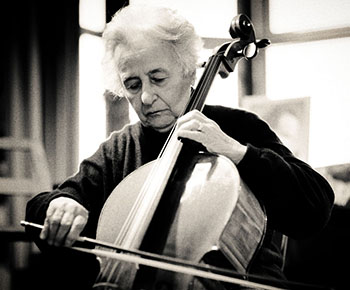
Anita Lasker-Wallfisch
Not long ago, Holocaust survivor Anita Lasker-Wallfisch met in a hotel restaurant in Germany with a man named Niklas Frank, whose father was a German war criminal.
They’d both been invited to appear together to speak to history students. While preparing at the restaurant, Lasker-Wallfisch and Frank were interrupted by a man who approached their table and complained they were “spoiling the pleasant atmosphere with all this talk of Auschwitz.”
Lasker-Wallfisch, 92, shared this story when delivering a speech to German Parliament on Jan. 31 – International Holocaust Remembrance Day. In attendance were newly elected members of the far-right party, Alternative for Germany (AfD), which ran on an anti-migrant platform and whose leader last year complained that Germany is too focused on its guilt.
Their presence made her next line about the man in the restaurant all the more pointed:
“Something like this would maybe not have been possible, five years ago, let’s say,” she said. “So be careful.”
Lasker-Wallfisch’s 30-minute speech was met with a sustained standing ovation from German Parliament.
In it, Lasker-Wallfisch – who survived in part because the Auschwitz orchestra needed her skills as a cellist – spoke in support of opening borders to refugees, noting that when her own family was in peril the world’s borders were “hermetically sealed.”
Lasker-Wallfisch also shared her incredible life story. The daughter of a lawyer father and violinist mother in Breslau, Lasker-Wallfisch and her two sisters learned to play musical instruments. The family enjoyed their little traditions: speaking French on Sundays, playing chess, reading classics together.
“And then it all came to an abrupt end,” she said. “This idyllic life came to an end.”
At age 12, Lasker-Wallfisch found that there were no music teachers left in her native Breslau who were willing to continue giving her cello lessons. She had to commute to Berlin.
Kristallnacht happened the following year, in 1938.
“And then we knew: we cannot stay here,” she told Parliament. “But it was too late. We were trapped.”
Her parents were deported in 1942, when Lasker-Wallfisch was 16. She never saw them again. She later learned that they were murdered after being forced to dig their own graves.
She and a sister named Renate were conscripted to work in a paper factory that was housing French prisoners of war. Here, the Lasker sisters engaged in clandestine activity, forging documents and procuring clothing for French prisoners to escape. Anita and Renate were caught and spent a year in prison. This turned out to work in their favor.
“It was better to be classed as a criminal than a Jew,” Lasker-Wallfisch told Parliament. “Because criminals were given a trial; Jews were fair game.”
The sisters were separately sent to Auschwitz, but again as convicted criminals, rather than as Jews, which worked to their benefit.
“I was not sent to Auschwitz on one of the mass transports of Jews, who were sentenced to live or die on arrival at the ramp,” she said.
When Lasker-Wallfisch arrived, she was greeted by another fortunate twist of fate: the death camp had an orchestra, and it needed a cellist.
“The orchestra was based in Block 12, close to the end of the road into the camp, just a few meters from Crematorium I and with an unobstructed view of the ramp,” she told Parliament. “We could see everything: the arrival ceremonies, the selections, the columns of people walking towards the gas chambers, soon to be transformed into smoke.”
The orchestra played marches at the camp gates for prisoners doing hard labor.
“For many, hearing music being performed in this living hell was the ultimate insult,” Lasker-Wallfisch said. “But for others, perhaps, it was a chance to dream of another world, if only for a few moments.”
She and Renate eventually found each other at the vast and chaotic death camp; Renate was emaciated, with open wounds on her legs.
One day, without warning, the sisters were rounded up with others and loaded onto a truck that took them to the Bergen-Belsen death camp in Germany. The Russians were closing in on the Germans.
Bergen-Belsen is where the Germans were dumping Jews en masse to starve.
“In Belsen, people simply perished,” she said. “We existed, surrounded by rotting corpses, and waited for it all to end.”
She and her sister were liberated by British forces on April 15, 1945. Lasker-Wallfisch was 19.
She went on to become a professional cellist in England. She and her husband, Peter Wallfisch, had two children.
“After the cataclysm that was the Holocaust, Germany’s conduct was exemplary,” Lasker-Wallfisch said. “There was no denial. Antisemitism was no longer in vogue.”
Lasker-Wallfisch finished her remarks by confessing that she once harbored a hatred of Germany, and had vowed never to set foot on German soil again.
“As you see, I broke my oath – many many years ago – and I have no regrets,” she said. “It’s quite simple: hate is toxic and ultimately, those who hate poison themselves.”
Photo by Benjamin Ealovega